Homepage Renate and Klaus Kuhl - Sailors' revolt in Kiel
CV Lothar Popp
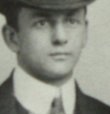 |
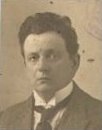 |
| Popp ca. 1908, Family owned |
Popp mid of 1920s State archive Hamburg |
Born: 7.2. 1887 Furth i. Wald as son of a lower public servant (royal Bavarian station master); cath., left church later (2)
Public school and apprenticeship as shop assistant in Augsburg (2)
Ran away from home at the age of 16 (4)
1904 - 1914 worker and merchant in Hamburg (2); his father died early and he got his mother to join him in Hamburg (6)
1906 member of the 'Monistenbund' (association of libertines) (4)
Joined the SPD, because he had heard, that Bebel and W. Liebknecht did not approve of the loans for the war in 1870/71 (1)
Joined the German Peace Society on 4 August 1914, because the SPD parliamentary faction approved of the war loans (1)
After the death of his mother he moved to Kiel, where he was able to take over three cigarette shops. (6) According to Otto Preßler he operated a "Bonbon-Laden" (sweets shop) in the Holstenstrasse and another one in the Elisabethstrasse. According to Gertrud Völcker he had a sweets sale, whereby the sweets were manufactured in Bordesholm (nearby Kiel) by a sympathiser.
1915 private for 20 months; early 1917 he was dismissed as unfit for service to Kiel as unfit for service, to become a mobilised fitter working at the Germania ship yard. (4)
At first activ for the SPD (Social-democratic Party for Germany); took part in a strike in March 1917 (not yet any active role, "by that time I had just arrived.") (1)
Lived near by the Wilhelmplatz in 51 Ringstrasse (1)
Founded in Kiel with ca. one thousand men the "Sozialdemokratischer Verein Gross Kiel - alte Richtung" [Social-democratic Association Kiel and Outskirts - Old Direction], a local organisation which existed only in Kiel. Chairman was W. Sens, who had a wooden leg and could not be recruited. Other chairpersons were besides Popp: Palavizini, Güth. Later the association joined the USPD (Independent SPD). Chairman of the USPD region Wasserkante (water edge) was the member of the Reichstag from Bremen Alfred Henke. (1 and 4)
Took part in the January strike 1918 in Kiel and founded the first Arbeiterrat (worker's council) in Germany. He was elected chairman. A day later he was apprehended and was sentenced to 2 months in prison for conducting an illicit meeting, which he served in Neumuenster. (1 and 4)
After being released from prison the ship yard refused to keep him. The USPD shop stewarts tried several days until they managed to find work for him at Gebrueder Genimb-Motorenwerke. There he worked for nine days and reported sick. Until the revolution started he did not go back, which he could do because he was financially secured. (4)
Leader of theKiel mutiny (November 1918) together with Karl Artelt. Popp ensured a solid basis for the initially spontaneously formed, unstructured soldiers' councils through elections in all units. On 7 November he was elected chairman of the Supreme Soldiers' Council. On 10 December he was replaced by Karl Artelt. However, he remained a political adviser to the Supreme Soldiers' Council ("Republik", newspaper of the USPD, 11 December 1918). This, however, was probably only pro forma, as he emphasised in later interviews that he had not bothered about the Soldiers' Council since the decision in favour of the National Assembly had been taken.
The effects of his then work he evaluated 1978 in retrospect as follows: "We were not revolutionaries, because we did not fight for a cause but we wanted to terminate a crazy thing. When we suddenly held the power, I wanted to make something out of the collapse of the Kaiserreich. In some votings I could beat Noske, who had come to strangle everything, but during practical work my group became inferior. We became tired. The revolutionaries did not want the revolution, they wanted the constituent national assembly in Berlin." Lothar Popp views this shift of political responsibility from the workers' and soldiers' councils to the national assembly, which - as he concedes was approved by the workers and soldiers - as "the first step into the collapse of the Weimar Republic". (8)
In the beginning of February 1919 Popp is mentioned in the USPD newspaper ("Republik"); he held a speech on the Wilhelmplatz in Kiel on the occasion of mounting tensions regarding the council republic of Bremen. Shortly after he went back to Hamburg.
He became a street hawker and a carny amongst others at the Hamburg Dom and he founded the association of the ambulant tradespersons and the carnies. (6).
Rejoined the SPD at the unification party congress in Halle (1922) (1)
Member of the Hamburg Bürgerschaft 1924-1931 (3); unsuccessfull candidatures for the Reichstag (2)
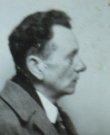 |
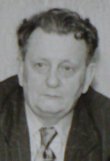 |
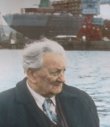 |
| Popp ca. 1941 Family owned |
Popp ca. 1960 Family owned |
Popp in Kiel 1974 Family owned |
1931/32 he went to Danzig (now Gdansk), where he sold toys and self manufactured cleaning powder. (6)
In 1933 he went to Prag in the Czech Republic. When the Nazis marched in he went by train via Linz and Switzerland to Paris. When France was occupied by the Nazis he fled to Marseille (6). He was expatriated by the Nazis (however his name does not appear in the expatriation lists; see Michael Hepp, Ausbürgerungen deutscher Staatsbürger, München 1985) (3). 1941 he sailed to Martinique on board the Winnipeg. The Winnipeg brought on two tours fighters for the Spanish republic to South America, a planned third tour could not take place because the Northern coast was blocked. Then Eleanore Roosevelt's organisation used the ship to help oppressed people from Germany. Lothar Popp managed to get on board one days before sailing, because he knew one of the sailors. Breitscheid and Everding were arrested, before the could get on board and later were handed over to the Nazis. The Winnipeg however did not make it to Martinique but was seized by a British ship and rerouted to Trinidad. "Once again the emigrants were placed behind barbed wire". After some time those who possessed US Visa were allowed to proceed (7). Lothar Popp went to New York (6). In the New York Passenger Lists, 1820-1957 the following entry was made: Lothar Popp, 54 years, single, merchant, born in Furth, Germany, visa issued in Marseille, France, last permanent residence: France, Marseille arrives at 6 June 1941 on board the S.S. Evangeline from Trinidad.BWI. in New York (5). He was received by Brauer, Weichmann and Katz and could stay temporarily in a house rented by SPD emigrants. (6)
Became a US citizen and opened a business in New York „Lothar
Popp Import and Export, Manufacturer of Educational Toys Microscopes
and Musical Instruments, 446 East Str. 84th Street New York“
Additionally he established together with Richard Kramer the small
shop „ELK Company“ 240 East 86th Street in New York,
where they manufactured and sold sweets especially marzipan (6)
He wrote articles for the "Neue Volks-Zeitung (new peoples newspaper)", which was published in USA (6)
In 1949/50 he came back to Germany, but stayed only for some months, because he wanted to keep his American citizenship. Thereafter he came often back to stay for some months, the family also visited him in the States until he finally settled in Hamburg again. Meanwhile legislation was changed so he could so without loosing his American citizenship. He kept his American citizenship until he died. (6)
He became honorary chairman of the association of ambulant tradespersons and carnies (6). His son Werner Popp after second world war became chairman for some time. Ernst Harberger, Lothar Popps half brother became after second world war became chairman of the professional work group for the ambulant tradespersons until he died. Harberger himself ran a fruit stall in front of the Klosterburg opposite the main station. (6)
After the death of his first wife Anna he married again in 1957 and ran a cafe together with his new wife. He was still an active member of the SPD. (1)
Interviews for NDR- and WDR- documenatry films covering his role in the marines' mutiny in Kiel
He had altogether five sons (6). He died on 27 4 1980 in Hamburg (2)
References:
1 Popp's own statement in the interview 1978 >>
2 Schröder, Wilhelm, Heinz, "Sozialdemokratische Parlamentarier....", Droste Verl., Düsseldorf, 1995; internet data base >>
3 Hints from Angelika Voß-Louis, Forschungsstelle für Zeitgeschichte in Hamburg
4 Interview notes from Dr. Volker Ullrich >>
5. See www.ancestry.de; BWI probably indicates British West Indies (by that time Jamaica, Barbados, Trinidad, Grenada, Antigua, St. Lucia, and the Bahamas.
www.ancestry.de notes Trinidad Cuba, but the scanned document clearly says Trinidad.BWI.!
6. Information from his son Lothar Fertig, 2009
7. See Lisa Fittko, Escape through the Pyrenees, as well as Varian Fry, Surrender on demand
8. Bernd Michels: Kieler Matrosenaufstand von 1918 - „Wir waren keine Revolutionäre“, in „Sozialdemokrat Magazin“, Heft 11/12 November /Dezember 1978Published works:
1 Popp, Lothar in Zusammenarbeit mit Artelt, Karl: Ursprung und Entwicklung der November-Revolution 1918, in: Gesellschaft für Kieler Stadtgeschichte - Sonderveröffentlichung 15, Kiel 1983. (Originalausgabe Ende 1918 beim Hermann Behrens Verlag in Kiel, Vorwort datiert am 13. Dezember 1918)
2 Popp, Lothar: Das Gesundheitsbrevier - Lange und glücklich leben durch vernünftig leben, Hamburg Möven-Verlag 1977These are the data known to me. For further information I would be grateful; -> Navigation button: "Kontakt"
Last updated 26 May 2022


